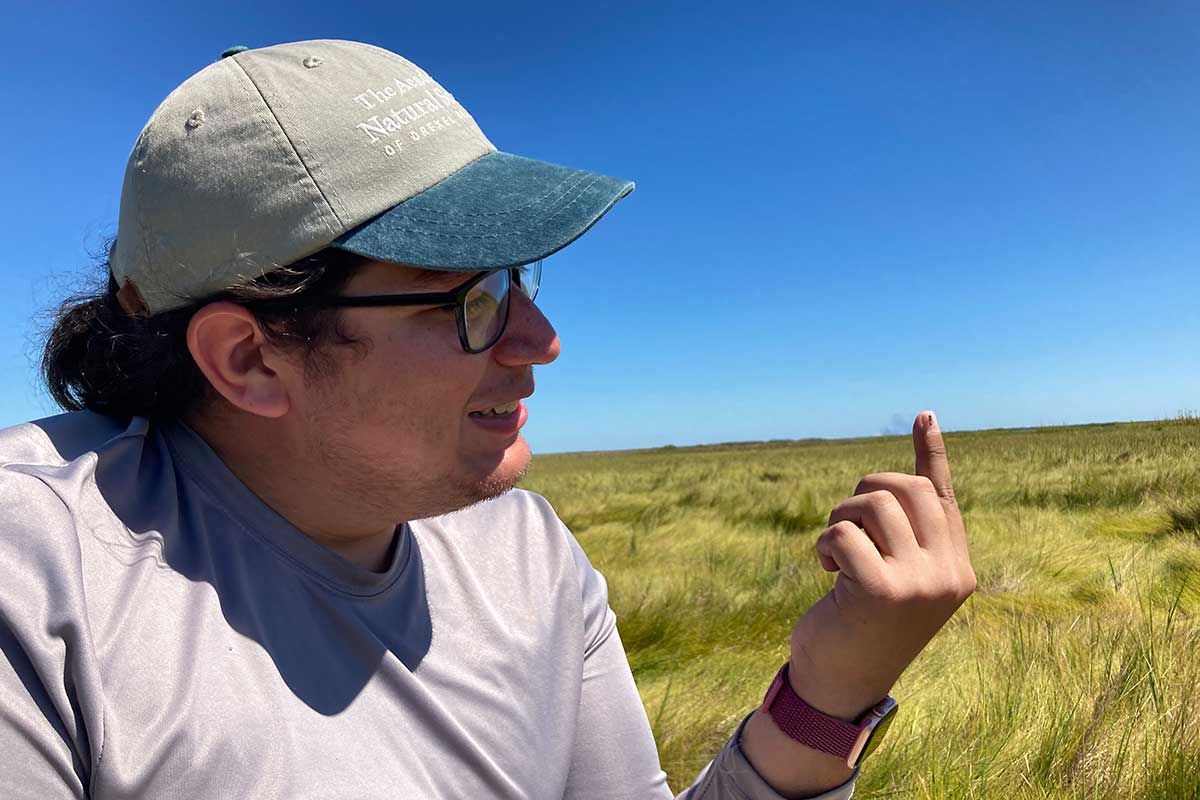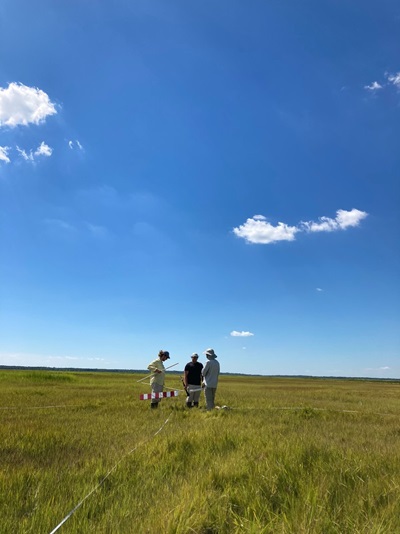Confronting the Effects of Coastal Climate Change
By Sarah Hojsak

Kris Freyland in the field
October 21, 2022
Environmental science major Kris Freyland sees the effects of climate change up close. Throughout their co-op this spring and summer, Freyland worked with Beth Watson, PhD, associate professor of biodiversity, earth and environmental science and senior scientist at the Academy of Natural Sciences’ Patrick Center for Environmental Research, to study the impact of saltwater intrusion into coastal forests.
“The forest is dying off, giving rise to ghost forests, and salinity and soil flooding is leading to more bare ground, wetlands or open water,” Watson explained. Ecohydrology, the study of the interactions between water and ecosystems, allows the research team to analyze the way the landscape has changed and predict how it might continue to erode in the future.
The team conducted field research along coastal areas in South Jersey, Long Island and Cape Cod with the goal of “understanding coastal habitat change and how it is being influenced by people—so anthropogenic factors, like nutrient pollution and climate change—to really understand how these areas can be best managed, conserved and restored,” Watson explained.
The project was one of 10 co-ops funded by the Dean’s Excellence Fund in the College of Arts and Sciences this year, designed to promote student-faculty collaboration. Faculty members receive resources to further develop their research, while students gain hands-on experience that positions them to succeed in their future careers.
“Coming into this, I didn't have any field experience, so I wasn’t able to gauge how difficult this would be at times,” Freyland said. “It's been really fun to see the more practical applications of everything that I've been learning up to this point, and the things that I hope to apply in my future career.”
In order to conduct field research in the wetlands, you can’t be afraid of the elements. A highlight of the experience for Freyland was surveying plants along the marsh forest, which they described as a bonding experience for the researchers and “as fun as walking through poison ivy and thorns can be.”
“It's pretty intense field work,” Freyland said. “I feel like that is not to be discounted.”

The project draws on Watson's research in climate change “adaptation, annotation, and mitigation.” She focuses on coastal watersheds and habitats in order to promote informed management and conservation, especially in transition zones between land and sea which serve essential ecological functions but are threatened by rising sea levels.
“I'm really interested in that coastal upland transition zone,” she explained. “I think it's really important for understanding what our coasts are going to look like in 50 years, and how they can best be conserved.” Her previous work has drawn attention to sea level rise in Southern New England and the ensuing loss of coastal wetlands, resulting in the region adapting its approach to coastal conservation.
The threat of climate change impacts us all, even those who don’t study its consequences. For younger generations, it has always been a part of life, and it causes an uncertainty about the future that can lead to anxiety and distress.
“Growing up at the time that I did, I've always heard awful things about how we're handling our climate and the direction that we're going if we continue how we have been,” Freyland said.
As the coordinator of Drexel’s university-wide climate change minor, Watson explores this climate anxiety with her students.
“Students really know what an issue climate change is, and how we need to reinvent ourselves to live more sustainability, as a country and as a world,” Watson said. “But a lot of times students don't know all of the things that are being done to address climate change, so they feel like things are actually more hopeless than they are.
“And I don't want to say that things are very rosy, but it's not like nothing's being done. We're going in the right direction, but it's also everyone's job to be involved in trying to be more sustainable going forward.”
Freyland recently switched majors from biology to environmental science to more deeply explore the effects of climate change and develop the skills necessary to address it, and is considering a possible career in land stewardship.
As Freyland explained, “Even if we're not actively stopping climate change on our own, which would be kind of an impossible ask, we are looking into ways to make those transitions easier on people and make more livable, sustainable solutions, which I think is super, super important and really cool.”
Photos courtesy of Beth Watson